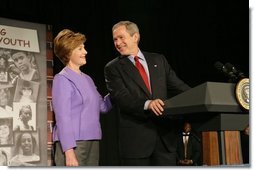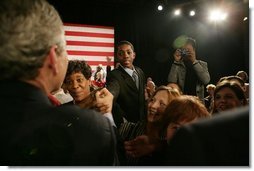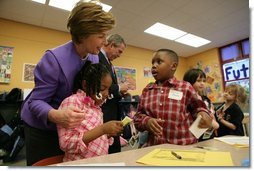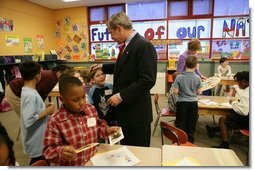
- Afghanistan
- Africa
- Budget Management
- Defense
- Economy
- Education
- Energy
- Environment
- Global Diplomacy
- Health Care
- Homeland Security
- Immigration
- International Trade
- Iraq
- Judicial Nominations
- Middle East
- National Security
- Veterans
|
Home >
News & Policies >
March 2005
|
For Immediate Release
Office of the Press Secretary
March 7, 2005
President and Mrs. Bush Discuss Helping America's Youth Initiative
Community College of Allegheny County
Allegheny Campus
Pittsburgh, Pennsylvania
3:58 P.M. EST
THE PRESIDENT: Thanks for the Warm Welcome Here to "Knowledge City." (Applause.) Laura and I Just Came from the Providence Family Support Center. (Applause.) You've got reason to cheer. (Laughter.) It is a fabulous place, and we really appreciate the Sisters of Divine Providence for letting us visit. (Applause.) Particularly Mary Joan Coultas and all the other sisters there for filling that space with love and compassion, trying to save souls one person at a time, and advancing a goal we all want, and that's for America to be the most hopeful country in the world for every single citizen. (Applause.) And that's really what we're here to talk about.
 I said, that's what we're here to talk about. But the truth of the
matter is, I'm the introducer. (Laughter and applause.) Yes. Not the
first time people have cheered when I said, I'm the introducer, and
Laura's the speaker. (Laughter.)
I said, that's what we're here to talk about. But the truth of the
matter is, I'm the introducer. (Laughter and applause.) Yes. Not the
first time people have cheered when I said, I'm the introducer, and
Laura's the speaker. (Laughter.)
I do want to thank Senator Arlen Specter for joining us today, and I appreciate him coming here. (Applause.) He's always telling me what to do, and I'm telling him what to do. (Laughter.) Since it's my airplane -- well, actually -- (laughter.) I'm proud of Congressman Tim Murphy. It's good to see you, Murph. Thank you for coming. (Applause.) Congresswoman Melissa Hart, thank you for being here. (Applause.) It's always good to see Bishop Donald Wuerl. (Applause.) Gosh, I think I've been with the Bishop three or four, maybe, five times. Every time I'm with him, he talks about education. (Laughter.) He loves education.
And it's -- one of the things -- when you talk about a hopeful America, it's important to always keep in mind the cornerstone of a hopeful America, the foundation of a hopeful America, is an education system which makes sure every single child can read, write and add and subtract. It's the beginnings of what a hopeful America is about.
And I appreciate, Bishop, your leadership when it comes to the Catholic education system here in Pittsburgh. It's a model of excellence. It is -- some day I hope that we're able to further the ability for parents to escape failure and go to any school they choose -- or send their -- send their children to any school they choose. (Applause.)
Speaking about organizations that work, I appreciate the Community College of Allegheny County for, one, lending us the facility, and, two, providing an education that is affordable and flexible and market-driven. (Applause.) I want to thank Paul Whitehead and Brian Johnson for being good hosts.
The community college system is a vital part of making sure people are able to gain the skills necessary to fill the jobs of the 21st century. Community colleges are able to adjust their curriculum to the needs of the local employer base. And if somebody needs nurses, they come to a community college system and help -- they help design a curriculum so we can train nurses. They need computer technology people. I mean, the community college system is vital and important.
 Melissa happens to be a board [sic] of this community college
system. And this administration will continue to support our community
colleges to make sure that people have the skills necessary to fill the
jobs which are being created in America, the jobs of the 21st century.
So thank you for letting us come here today.
Melissa happens to be a board [sic] of this community college
system. And this administration will continue to support our community
colleges to make sure that people have the skills necessary to fill the
jobs which are being created in America, the jobs of the 21st century.
So thank you for letting us come here today.
And now it's my honor to introduce Laura. (Laughter and applause.) She and I share a passion that we've got to make sure that the great strength of our country -- that is, the hearts and souls of our citizens -- are directed in such a way that every child can be saved. That's what we want. And we're worried. We're worried about gangs, we're worried about drugs, we're worried about bad choices. But we also know that if we can, in our small way, encourage people to put their arm around somebody and say, I love you, what can I do to help you, if we can encourage people to step forward and to volunteer their time and talent and compassion, this country can be a better place.
So one of the big initiatives that she is -- will be leading on behalf of my administration, the country, is how to utilize the assets at our disposal to make sure that every single child, every single person has a bright and hopeful future.
You know, de Tocqueville, years ago, wrote about America. In 1832, he wrote about the great capacity of our country to have people of -- who cared about their country to be able to associate in a voluntary way to kind of transcend individualism.
In other words, what he was really saying is, America is a unique place where people come together to serve a cause greater than themselves. And I think the patriotism of the 21st century is -- can be found when somebody goes to the center we just came at and volunteer his or her time, and says to a child, I love you, what can I do to help you realize your dream? And Laura's here to talk about that on behalf of our country.
I'm proud of her as the First Lady. I love her dearly as a wife. She's a fabulous mother. Laura Bush. (Applause.)
MRS. BUSH: Thanks, have a seat. It's an honor to be introduced by the President of the United States, and this is a real role reversal. I've listened to a million of his speeches. (Laughter.) Now he's going to get to listen to one of mine.
I wanted to thank everyone here. Thank you all very much for coming out here to the Community College of Allegheny County and welcoming us. Monsignor William Kerr, Sister Maria Fest, and Tish Donze-Howard, thank you all very, very much for being here with us. And thanks to the men and women of the Providence Family Support Center who just showed us their work.
 We dropped in on two programs, a great after-school program for
children in the kindergarten through 5th grade, and then another
program for teenagers. The teen program is new. It was started in
January because the staff recognized that teenagers in their community
needed a place to go after school, and they needed adults who could
help them learn how to make the right choices in their lives.
Identifying a community's needs, and taking action to meet those needs
is at the heart of helping America's youth.
We dropped in on two programs, a great after-school program for
children in the kindergarten through 5th grade, and then another
program for teenagers. The teen program is new. It was started in
January because the staff recognized that teenagers in their community
needed a place to go after school, and they needed adults who could
help them learn how to make the right choices in their lives.
Identifying a community's needs, and taking action to meet those needs
is at the heart of helping America's youth.
President Bush asked me to lead this new effort, and when he did, I eagerly accepted. For years, I've worked in schools or I've visited schools and after-school programs that help children who might be at greater risk of getting in trouble. These programs are changing young people's lives for the better, and children and parents need to know where they can get help.
Some trends among youth are heading in the right direction, but others are not. Risky behaviors, including illegal drug use, alcohol and tobacco use, violence and early sexual activity are still among the top causes of disease and early death among young people. In addition, more children in America are growing up without fathers in their lives. And studies show that an overwhelming number of violent criminals in the United States are males who grew up without a father.
Helping America's Youth will help children and teenagers by emphasizing three key areas: family, school and community. The initiative highlights the importance in every child's life of a loving, caring adult, whether that's a parent, a grandparent, a teacher, a coach, a mentor, or a pastor. Helping America's Youth is an umbrella initiative that incorporates several federal programs that already exist or that have been proposed in the President's budget.
This fall, we will convene a White House summit on Helping America's Youth. Researchers, policy experts, educators, parents and community leaders will discuss the best way to help children avoid risky behaviors and build successful lives. Researchers will identify the causes of many, many problems that our children will face, and the best and most effective plans to overcome those problems. Community groups, including faith-based groups, will tell us what's working in the field. The conference will introduce a new assessment tool that will allow communities across the country to identify the challenges that they face and the services that they already have that address these challenges and where their gaps are. Communities can then build off existing government programs as well as volunteer faith-based or community programs, to create seamless efforts to help their local children.
 Over the past month, since George announced the Helping America's
Youth initiative, I visited several cities to find out what
difficulties today's children are facing and who is there to support
them. Innovative ideas and community spirit are producing great
programs all over the country. A program called Think Detroit teaches
children life lessons through sports. Today, in Detroit, more than 650
coaches volunteer their time to mentor thousands of young children
while they coach them in sports.
Over the past month, since George announced the Helping America's
Youth initiative, I visited several cities to find out what
difficulties today's children are facing and who is there to support
them. Innovative ideas and community spirit are producing great
programs all over the country. A program called Think Detroit teaches
children life lessons through sports. Today, in Detroit, more than 650
coaches volunteer their time to mentor thousands of young children
while they coach them in sports.
In Northeast Philadelphia, I visited a Boys and Girls Club that has a Passport to Manhood program. Statistics show that boys are having an especially tough time growing up. They're more likely to fall behind girls in schools, fewer boys than women -- fewer men than women are graduating from college, and with masters degrees, and boys, on an average, are more likely to join gangs, commit crimes, and end up in prison.
In the Passport to Manhood program, boys ages eight to 16 meet with a group leader to talk about the characteristics men should have and the character traits they want to develop in themselves. These young men in these discussions see an ideal of manhood that respects life and women and rejects violence.
The programs in Detroit and Philadelphia are successful because adults are using sports and games and communication to give young people positive messages about education and character. These adults serve as a counter-balance to negative peer pressure. They serve as the safe harbor in a place of violence, or the inspiration to keep working toward goals like graduating from high school and enrolling in college.
Research shows that the more children and youth hear these positive messages from adults, the less likely they are to engage in risky behaviors. Parents and family are the first and most important influence in every child's life, but we all know there's no direction book that comes with a baby. Plenty of parents need help. And organizations like the Providence Family Support Center that we've just visited are providing it. Providence offers parenting classes for moms and dads, as well as help finding a job, or learning how to keep a budget. Parents can take advantage of lessons in anger management, and they can participate in home visits to improve their parenting skills.
Helping America's Youth includes two proposed federal programs to strengthen marriages and help families: A responsible fatherhood initiative would support community and faith-based organizations to provide education, training and other services to help fathers stay involved emotionally and financially in their children's lives. (Applause.) And the healthy marriage initiative would support research into the best ways to keep marriages strong and provide funding for community groups that help couples establish stable marriages.
Schools are the second major influence in a child's life. The No Child Left Behind Act ushered in a new era in education. Now we ask schools to show us that every child is learning. That means every child of every race in every type of school from every kind of family.
Our nation will need 2 million new teachers over the next decade to achieve this goal. And we need to recruit more men and minorities to the teaching profession -- men who will be good role models for the boys in their classrooms. The Community College of Allegheny County is helping by providing training for teachers with a focus on teaching in urban areas.
We need excellent reading teachers. Reading is the most important skill children learn. And all of the rest of their school work depends on their ability to read. Evidence shows that if students haven't learned to read on grade level by the third grade, the odds against them catching up are not great. And the student who makes it to high school without sound reading skills are at greater risk of dropping out.
New research in education gives us a better understanding of how people at different stages in life, young children, teenagers, and adults, respond to different teaching methods. Part of the Helping America's Youth Program is the Striving Readers Program. Striving Readers assists states and school districts implement research-based reading programs for students in the upper grades. As more middle schools and high schools use these reading programs that are proven to work, more students will improve their reading skills and stay in school and be prepared for life after graduation. Last year, Striving Readers started with $25 million in funding. For 2006, the President has requested $200 million to help make sure students in every grade learn to read. (Applause.)
And our communities are the third main influence in a child's life. Parents and schools rely on other adults in our communities to reinforce positive messages and to help children fill their time with constructive activities. More than 14 million school-age children take care of themselves after school. And the hours between 3:00 p.m. and 6:00 p.m. are peak hours for juvenile crime. After school programs like the one we just visited at Providence Family Support Center can keep children safe and improve their academic performance.
James Moorefield is a single dad who needed help in raising his nine-year-old son, Drew. James and Drew are here today with us. I don't see them, okay, but they are here. Maybe they'll stand in a minute. There they are. (Applause.) Thank you. Drew has attended the after school program and the summer camp at Providence since 2001. James said, "Being able to leave Drew in a supportive and educational environment gives him peace of mind while he can go to work."
Albert Conicella is 15 years old, and by all accounts a great football player. His high school, Central Catholic, puts an emphasis on community involvement. So Albert has been spending time at Providence as a tutor and a mentor to the younger boys in the after-school program. The boys at Providence have really taken to Albert because he's still young enough to be cool. (Laughter and applause.) Is Albert here? There's Albert.
Albert sets a great example for how these boys -- young boys should behave as they grow older. President Bush has called on all Americans to engage in 4,000 hours of community service throughout their lives. Studies show that there are 15 million children in America who are searching for a role model or a mentor. Surely, there are 15 million caring adults who can help fill that need.
People who don't know where to get started can look at the USA Freedom Corps website, usafreedomcorps.gov. The site contains the largest online clearing house of volunteer opportunities ever created. The USA Freedom Corps and the White House Office of Faith-Based and Community Initiatives support neighborhood groups and volunteer organizations that are helping families through drug treatment, mentoring, abstinence education, and my other services. Many of the community leaders here today have worked with USA Freedom Corps and the Office of Faith-Based and Community Initiatives, because both offices are useful for recruiting volunteers and expanding the reach of such organizations.
The success of Helping America's Youth depends on organizations like these and on the individual commitment of every American. The time between childhood and adulthood is too short, as George and I can attest. And every moment in a child's life is precious.
After my visit to Think Detroit, a newspaper reporter asked one of the little boys that I met what he thought of my visit. And I was moved when I read that he simply said, "I wish she could stay here." (Applause.)
Children want us in their lives and they need us in their lives. And as I've learned from the remarkable men and women I've met around our country, each of us has the power to make the difference in the life of a child.
Thank you all very, very much for your efforts to help America's youth. (Applause.) Thanks for being here today. (Applause.)
END 4:20 P.M. EST


